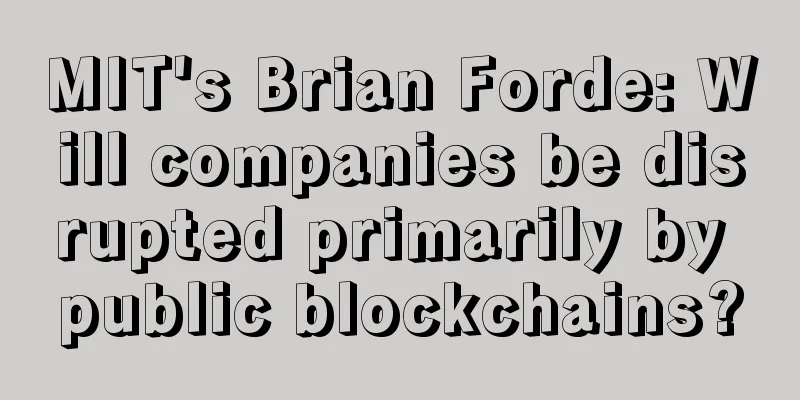MIT's Brian Forde: Will companies be disrupted primarily by public blockchains?

Translation: Nicole The 2016 Exponential Finance Conference, co-organized by Singularity University and CNBC, was held on June 7-8. Distributed ledger technology and applications were once again widely mentioned, and Brian Forde, principal of the MIT Media Lab, gave attendees an overview of current initiatives. Located at Moffett Federal Airfield in California and sponsored by well-known high-tech companies including Google, Singularity University is a research center dedicated to studying disruptive applications of the world of the table, doubling down on the development of technology. The Exponential Finance conference explored how rapidly developing technologies such as artificial intelligence and machine learning, cybersecurity, quantum computing, crowdfunding and distributed ledgers are rapidly disrupting the entire financial industry. Other Exponential conferences have touched on healthcare and manufacturing issues in the same way. Last year, the 2015 Index Finance Conference featured outstanding distributed ledger and blockchain technology. Blythe Masters, a former JPMorgan Chase star who is in charge of Digital Asset Holdings, believes that financial blockchain applications will be calculated in trillions. The 2016 Index Finance Conference will continue to explore the disruptive impact of distributed ledgers. Forde, the lead director of the Digital Currency Initiative at the MIT Media Lab, delivered a speech titled “Decentralized Business,” focusing on the rapid transformation driven by blockchain and how it is changing the financial services industry. Singularity reported that Forde, a former senior adviser on mobile and data innovation at the White House, believes that blockchain technology and digital currency will have the same impact on society as the Internet. Brian Forde He said:
He added that this was a major opportunity for developing countries to "leapfrog" to the forefront of innovation. According to PC Magazine, Forde draws attention to some interesting blockchain use cases being developed at MIT. One interesting pathfinder recently reported by Bitcoin Magazine is the Digital Certificate Project at the MIT Media Lab. This is an open source project to build an ecosystem for creating, sharing, and verifying blockchain-based transaction certificates. Certificates will be publicly and transparently registered to the blockchain, and schools and employers will publish digital proof of membership, achievements, and complete shareable formats that students can use when applying for jobs or furthering their studies. Forde said:
Forde also mentioned MedRec, a system built on a private Ethereum network, which is a decentralized content management system for patient medical data. This allows patients to access their medical records. Another interesting project is Enigma, a peer-to-peer network built by MIT students that uses secure computing methods to allow all parties to jointly store and run calculations while keeping the data private. Enigma wants developers to build "privacy-by-design", end-to-end decentralized applications without going through a trusted third party. Other innovative applications of distributed ledger technology demonstrated at the 2016 Exponential Finance Conference include: Abra, Augur, Bitwage, BlockCypher, Bluzelle, Credit Dream, Dwolla (currently focusing more on blockchain), Everledger, and Mycelia. Since the Digital Currency Initiative has become the central bitcoin hub and the MIT Media Lab wants to be the de facto leader in bitcoin technology development, Forde supports open, public, permissionless blockchains as opposed to the closed, private, “permissioned” blockchain concept that is now very popular among mainstream financial players. Forde said:
Forde believes that public blockchains such as Bitcoin are open source initiatives, while private blockchains such as R3 are commercializing blockchains and applying them to business. In an interview with SingularityHub, Forde said the bitcoin blockchain "is the most secure blockchain in the world, and bitcoin mining, like payment processing verification, protects the blockchain. The most important aspect to look at is the number, diversity and computing power - or 'hash rate' - that independent miners are competing to do every ten minutes. |
<<: The familiar Bitcoin is back, still the same flavor
>>: Sweden is testing blockchain technology for land registration
Recommend
My right eyelid keeps twitching. What does Zhou Gong's dream interpretation say? Is it a good omen or a bad omen?
As the saying goes, "left eye twitching mean...
What to do if your fate is not good
There are unpredictable changes in the weather, a...
Four types of moles that can bring good luck
1. Mole on the top of the head In physiognomy, if...
Which moles on a man's face cannot be removed? They are the moles that bring wealth.
1. Mole on forehead In physiognomy, if a man has ...
Walmart wants to use blockchain to make shopping 'smarter'
Rage Comment : A recently published patent applic...
What do unfeeling men have in common?
What do unfeeling men have in common? Being heart...
Big Short Michael Burry warns: Governments may "suppress" Bitcoin to protect their currencies
Source: China Finance Network Michael Burry, a he...
What does it mean when there is no life line on the palm?
In palmistry, the life line, wisdom line and love...
Is it good for a man to have a mole on his upper eyelid? What does it mean when a man has a mole on his right eyelid?
As one of the traditional physiognomy techniques, ...
Nvidia will design dedicated GPUs for Ethereum mining and limit the computing power of RTX 3060 graphics cards
Nvidia announced on Thursday that it will release...
Bitdeer will start selling Ant S19 packages tomorrow
BitDeer officially announced that the Antminer S1...
The most likely to get rich
The most likely to get rich 1. If the lines on a ...
What are the facial features of girls who are prone to late marriage?
Facial features of girls who are prone to late ma...
What kind of face is good for a girl to marry?
For a woman, marrying well is the happiest thing ...
Eyes determine your fate between 35 and 40 years old
The eye, also known as the eye, the eye, or the f...









